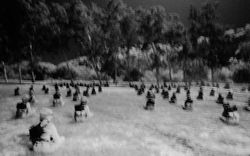To Conquer Her Land / Poulomi Basu
May 2015
 |  |
|---|---|
 |  |
 |  |
 |  |
 |  |
 |
Exhibit opening, screening, & talk
Tuesday May 26, 2015, 7:30 PM
Moderated by James Estrin, photographer, writer, and co-editor at The New York Times' Lens
From 2009-2014, Poulomi Basu photographed the transformation, from woman to soldier, of India's first female troops. Their duty was, and is, to guard the gates and frisk female crossers along critical borders of Punjab, and Jammu & Kashmir’s Line of Control. That sounds far more straightforward than it is: the border is its own world of conflict, firing, killing, suicide bombing, jingoistic parades, fireworks, smuggling (people, arms, drugs), and for the soldiers, crises of loneliness and small moments of glory. Not least, the women themselves embody issues of poverty, class, youth, and gender.
Fittingly, Basu’s images, which have brought this story home in India, range in style. And it is her style that pulls in the viewer. There are echoes of Gerda Taro’s Spanish militiawomen, and nods to Tim Hetherington’s soldiers asleep and at play while on patrol in Afghanistan. But Basu breaks new ground too. She cross-cuts cinematic visions of killer warriors with glimpses of soldiers in down-time, dancing or otherwise sharing intimacies. India hopes these troops will reinforce its image as a progressive democracy, but Basu’s project transcends public relations and is sure to contribute significantly to our collective notions of female defenders. That these first generations of soldiers work on border control while traversing cultural boundaries makes the web of complexities complete.
~ Anna Van Lenten
POULOMI BASU is a photographer based in New Delhi and London, working across Asia. She completed her Masters in Photojournalism and Documentary Photography at the London College of Communication. Her work focuses on under-reported contemporary issues where gender and the formation of identity are often defining characteristics. She is interested in the lives of ordinary people who find themselves in extraordinary circumstance; in those individuals and groups who quietly challenge the prevailing orthodoxies of the world in which they live.